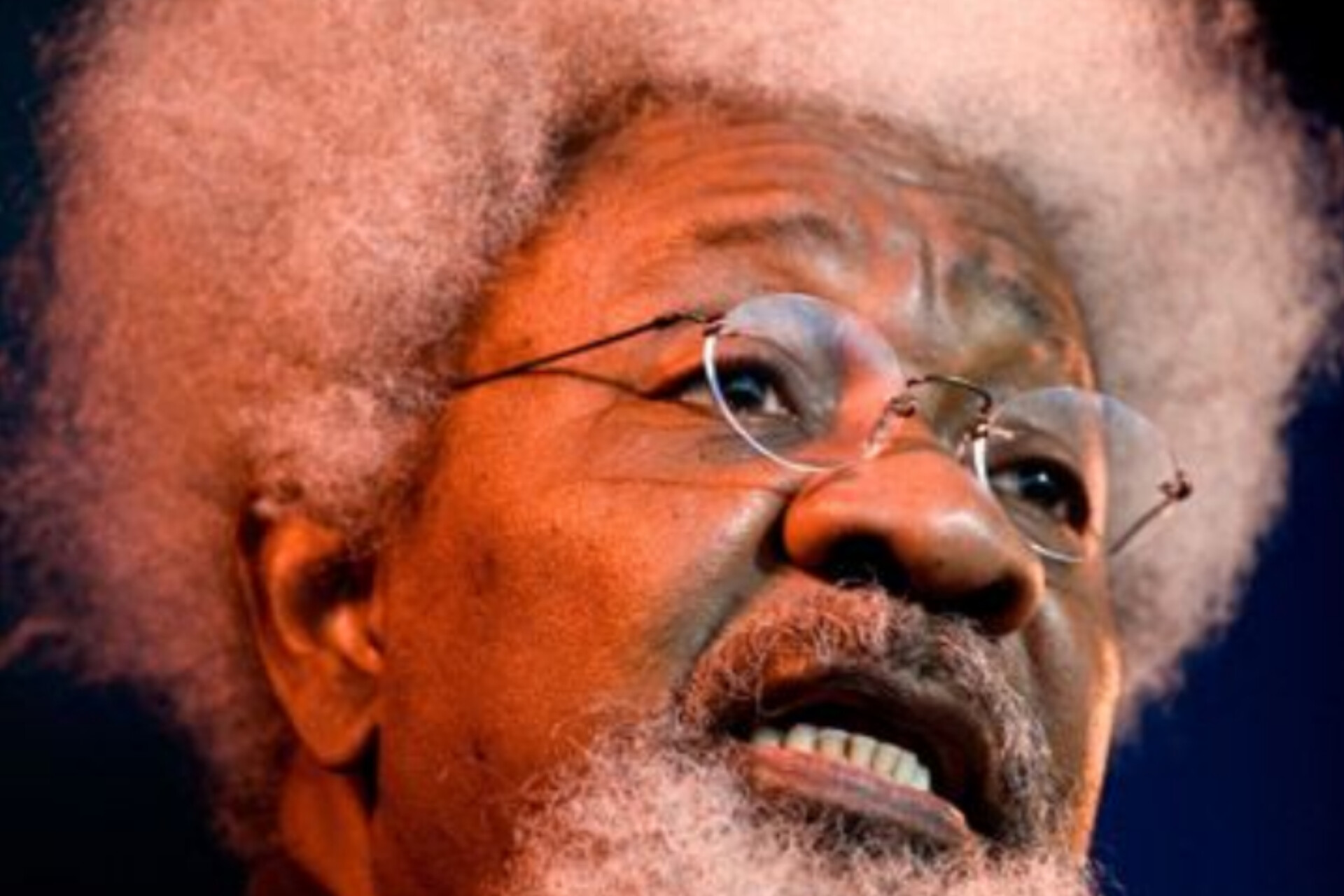Wole Soyinka is a renowned playwright, poet, essayist, and political activist. He made history by becoming the first African laureate to be awarded the Nobel Prize in Literature in 1986.
Soyinka’s extensive body of work spans various genres, blending modern Western literary traditions with his deep-rooted Yoruba heritage, often addressing the political and social issues of contemporary Africa with a satirical yet poignant style.
President Bola Tinubu recently inaugurated Arterial Road N20 in Abuja, named in honour of Prof. Wole Soyinka.
Early Life
A descendant of the Yoruba nobility, Akinwande Oluwole Babatunde Soyinka was born into a culturally rich and politically active family on July 13, 1934, in Abeokuta, Nigeria.
His father, Samuel Ayodele Soyinka, was an Anglican minister and headmaster, while his mother, Grace Eniola Soyinka, was a shop owner and political activist.
The cultural syncretism of Yoruba traditions and Anglican Christianity shaped Soyinka’s upbringing, fostering his early intellectual and artistic inclinations.
Education
Soyinka’s academic journey began at St. Peter’s Primary School and Abeokuta Grammar School, where he excelled in literary composition.
He furthered his education at Government College in Ibadan, an elite secondary school.
Soyinka then attended University College Ibadan, studying English literature, Greek, and Western history.
His academic pursuits took him to the University of Leeds in England, where he completed his studies in English literature under the mentorship of Wilson Knight, earning an upper second-class degree and embarking on an MA.
Career
Soyinka’s career took off with his work as a play reader for the Royal Court Theatre in London.
His early plays, “The Swamp Dwellers” and “The Lion and the Jewel,” were well-received and marked the beginning of his prolific output in drama.
Returning to Nigeria, he became a prominent figure in Nigerian theatre, founding the “Nineteen-Sixty Masks” and writing critically acclaimed plays such as “A Dance of the Forests,” which satirized Nigeria’s political elites during its independence celebrations.
Soyinka’s activism intensified during the Nigerian Civil War, leading to his imprisonment for 22 months due to his attempts to mediate between the conflicting parties.
Despite harsh conditions, he produced significant literary works while in solitary confinement, including “Poems from Prison.”
Personal Life
Soyinka has been married three times and has children. His first marriage to Barbara Dixon, a British writer, produced two children, Olaokun and Morenike.
His second marriage to Olaide Idowu, a Nigerian librarian, brought four more children into his life.
He is currently married to Folake Doherty, with whom he has three sons.
Soyinka has also been open about his battle with prostate cancer, which he revealed in 2014.
Awards and Achievements
Soyinka has received numerous accolades throughout his career. Notable awards include:
- 1973: Honorary D.Litt., University of Leeds
- 1973–74: Overseas Fellow, Churchill College, Cambridge
- 1983: Elected an Honorary Fellow of the Royal Society of Literature (Hon. FRSL)
- 1983: Anisfield-Wolf Book Award, United States
- 1986: Nobel Prize for Literature
- 1986: Agip Prize for Literature
- 1986: Commander of the Order of the Federal Republic (CFR), national honour of Nigeria
- 1990: Benson Medal from the Royal Society of Literature
- 1993: Honorary doctorate, Harvard University
- 2002: Honorary fellowship, SOAS University of London
- 2005: Honorary doctorate degree, Princeton University
- 2005: Enstooled as the Akinlatun of Egbaland, a Nigerian chief, by the Oba Alake of the Egba clan of Yorubaland. Soyinka became a tribal aristocrat by way of this, one vested with the right to use the Yoruba title Oloye as a pre-nominal honorific.
- 2009: Golden Plate Award of the American Academy of Achievement presented by Awards Council member Archbishop Desmond Tutu at an awards ceremony at St. George’s Cathedral, Cape Town, South Africa
- 2013: Anisfield-Wolf Book Award, Lifetime Achievement, United States
- 2014: International Humanist Award
- 2017: Joins the University of Johannesburg, South Africa, as a Distinguished Visiting Professor in the Faculty of Humanities
- 2017: “Special Prize” of the Europe Theatre Prize
- 2018: University of Ibadan’s arts theatre renamed as Wole Soyinka Theatre.
- 2018: Honorary Doctorate Degree of Letters, Federal University of Agriculture, Abeokuta (FUNAAB).
- 2022: Honorary Degree from Cambridge University, bestowed upon people who have made outstanding achievements in their respective fields, among others.
Works
Soyinka’s literary output is vast and diverse. Notable plays include:
- Keffi’s Birthday Treat (1954)
- The Invention (1957)
- The Swamp Dwellers (1958)
- A Quality of Violence (1959)
- The Lion and the Jewel (1959)
- The Trials of Brother Jero (1960)
- A Dance of the Forests (1960)
- My Father’s Burden (1960)
- The Strong Breed (1964)
- Before the Blackout (1964)
- Kongi’s Harvest (1964)
- The Road (1965)
- Madmen and Specialists (1970)
- The Bacchae of Euripides (1973)
- Camwood on the Leaves (1973)
- Jero’s Metamorphosis (1973)
- Death and the King’s Horseman (1975)
- Opera Wonyosi (1977)
- Requiem for a Futurologist (1983)
- A Play of Giants (1984)
- Childe Internationale (1987)
- From Zia with Love (1992)
- The Detainee (radio play)
- A Scourge of Hyacinths (radio play)
- The Beatification of the Area Boy (1996)
- Document of Identity (radio play, 1999)
- King Baabu (2001)
- Etiki Revu Wetin
- Alapata Apata (2011)
- “Thus Spake Orunmila” (in Sixty-Six Books (2011)
Novels
- The Interpreters (1965)
- Season of Anomy (1973)
- Chronicles from the Land of the Happiest People on Earth (Bookcraft, Nigeria; Bloomsbury, UK; Pantheon, US, 2021)
- Harmattan Haze on an African Spring
Short stories
- A Tale of Two (1958)
- Egbe’s Sworn Enemy (1960)
- Madame Etienne’s Establishment (1960)
- Memoirs
- The Man Died: Prison Notes (1972)
- Aké: The Years of Childhood (1981)
- Ibadan: The Penkelemes Years: a memoir 1945–1965 (1989)
- Ìsarà: A Voyage around Essay (1989)
- You Must Set Forth at Dawn (2006)
- Climate of Fear (Literature) (2005)
Poetry collections
- Telephone Conversation (1963) (appeared in Modern Poetry in Africa)
- Idanre and other poems (1967)
- A Big Airplane Crashed into The Earth (original title Poems from Prison) (1969)
- A Shuttle in the Crypt (1971)
- Ogun Abibiman (1976)
- Mandela’s Earth and other poems (1988)
- Early Poems (1997)
- Samarkand and Other Markets I Have Known (2002)
Essays
- “Towards a True Theater” (1962)
- Culture in Transition (1963)
- Neo-Tarzanism: The Poetics of Pseudo-Transition
- A Voice That Would Not Be Silenced
- Art, Dialogue, and Outrage: Essays on Literature and Culture (1988)
- From Drama and the African World View (1976)
- Myth, Literature, and the African World (1976)
- The Blackman and the Veil (1990)
- The Credo of Being and Nothingness (1991)
- The Burden of Memory – The Muse of Forgiveness (1999)
- A Climate of Fear (the BBC Reith Lectures 2004, audio and transcripts)
- New Imperialism (2009)
- Of Africa (2012)
- Beyond Aesthetics: Use, Abuse, and Dissonance in African Art Traditions (2019)
Films
- Kongi’s Harvest
- Culture in Transition
- Blues for a Prodigal
Translations
- The Forest of a Thousand Demons: A Hunter’s Saga (1968; a translation of D. O. Fagunwa’s Ògbójú Ọdẹ nínú Igbó Irúnmalẹ̀)
- In the Forest of Olodumare (2010; a translation of D. O. Fagunwa’s Igbo Olodumare)
Social Media Handle
Wole Soyinka maintains a presence on social media, particularly on Instagram under the handle @wolesoyinkaofficial, where he shares insights into his works and thoughts on current events.
Controversy
In April 2023, Soyinka stirred controversy with his criticism of the supporters of Peter Obi, the Labour Party presidential candidate.
He referred to their refusal to accept corrective criticism as a “badge of honour” and a “certificate of commitment.”
His remarks led to a backlash from Obi’s supporters, known as ‘Obidients,’ who accused Soyinka of undermining their movement.
In response, Soyinka condemned what he described as “incipient fascism” within the political arena and expressed his disillusionment with Nigeria’s democr
atic process.
Net Worth
Wole Soyinka’s estimated net worth is around $10 million, reflecting his prolific career and numerous contributions to literature and political activism.




